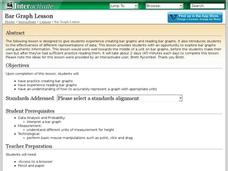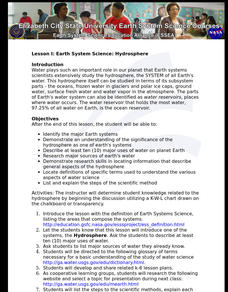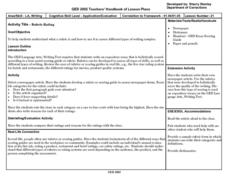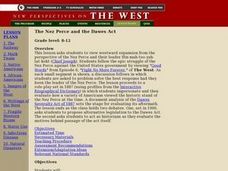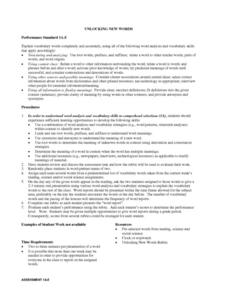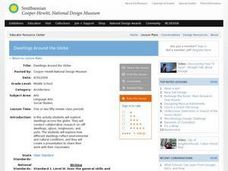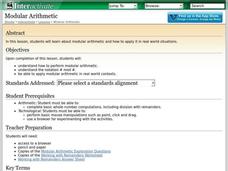Curated OER
The Bell Curve
Students explore the concept of the bell curve. In this bell curve lesson, students discuss the controversy associated with the bell curve. Students use an applet to explore a normal distribution. Students discuss mean, median, mode,...
Curated OER
Bar Graph Lesson
Students make a bar graph. In this graphing lesson, students discuss why bar graphs are used and are shown bar graph examples. Students create their own bar graph to compare the heights of different things around the world. Students...
Curated OER
Introduction to Linear Functions
Students are introduced to the basic ideas needed for understanding linear functions.
Curated OER
Dogs vs. Cats: Pet Ownership Essay
Young scholars analyze patterns of organization used in writing to determine how and when comparisons and contrasts can be effectively utilized to identify similarities and differences or pros and cons.
Curated OER
ADULT ESOL LESSON PLANS--Maintaining Employment
Pupils analyze payroll deductions from their pay stubs to view a variety of government services and company benefits. After defining the vocabulary words on the board, they associate those words to certain sections on their pay stubs.
Curated OER
More Complicated Functions: Introduction to Linear Functions
Learners explore the concept of linear functions. In this linear functions lesson plan, students translate linear functions from tables to graphs to equations. Learners use an applet to write a function rule for a linear function in...
Curated OER
Perimeter
Students explore the concept of perimeter. In this perimeter lesson, students discuss how to find perimeter of various shapes. Students use the Perimeter Explorer applet to find the perimeter of various shapes.
Curated OER
Mammal Morphology: bats and people
In this mammals worksheet, students compare and contrast the physical characteristics of bats and people by filling out a chart. Students complete 17 rows in the chart and answer 3 short answer questions.
Curated OER
Greek Prefixes In Science
Seventh graders look into their science textbooks to find words that utilize the Greek prefixes, "anti," "epi," "endo," and "micro." Student pairs complete a worksheet embedded in the plan where they list as many of these words as they can.
Curated OER
Earth System Science: Hydrosphere
Students identify the major Earth systems, and describe at least ten major uses of water on planet earth. They research major sources of earth's water, and describe general aspects of the hydrosphere.
Curated OER
Rubric Rating
Students develop a rubric or scoring guide to assess newpaper articles. They rate the story and write the reasons for the rating. An Essay Scoring Guide is attached for reference.
Curated OER
The Nez Perce and the Dawes Act
Eleventh graders explore westward expansion in the United States. In this US History lesson, 11th graders watch the epic struggle of the Nez Perce. Students evaluate how a variety of Americans viewed Nez Perce through a role play.
Curated OER
Area Explorations
Students explore the concept of area. For this area lesson, students find the area of irregular shapes with right angles. Students break down each irregular shape into multiple regular shapes in order to find the area. Students...
Curated OER
Sky Pictures
Learners investigate constellations. In this space science lesson, students view transparencies of constellations and identify the zodiac constellations. Learners research the legends connected with the constellations.
Curated OER
Shakespeare's Othello and the Power of Language
Students explore the basis of Iago's persuasive power by analyzing Shakespeare's use of rhetoric and figurative language. In this Othello instructional activity, students analyze Iago's rhetoric in monologues and dialogues with other...
Curated OER
Take Charge of Your Financial Future
Students discuss Biz Kids understanding that it is a program to help people become financially educated. In this mathematics lesson, students view an episode and discuss what they would do if given various situations like going out or...
Curated OER
Art in Crafts
Students examine the concept of craft and, by creating blueprints for various craft objects, explore the advantages and disadvantages of craft in our modern world.
Curated OER
Unlocking New Words
Students are introduced to the various types of suffixes and prefixes. In groups, they identify the root words and determine the proper suffix or prefix to add to the root. They complete a worksheet and review their answers to end the...
Curated OER
Dwellings Around the Globe
Students explore dwellings around the globe and conduct collaborative research on cliff dwellings, igloos, longhouses, and yurts. They then explore how different dwellings reflect environmental and cultural conditions, and they create a...
Curated OER
Finding Remainders in Pascal's Triangle
Students use clock arithmetic to find remainders. In this patterns in math lesson, students explore the relationship between clock arithmetic and remainders using a computer applet. Students also identify patterns in Pascal's triangle...
Curated OER
Modular Arithmetic
Students investigate modular arithmetic and how to use it to solve real world problems. In this modular arithmetic lesson, students use computers to work on modular arithmetic after a teacher guided lesson. They complete guided practice...
Curated OER
Fire!, Probability, and Chaos
Students explore the concept of probability. In this probability lesson, students simulate a controlled forest burn using an applet. Students vary the probability of trees burning and predict what will happen.
Curated OER
Probability and Sports
Students explore the concept of probability in sports. In this probability in sports lesson, students research a sport that they enjoy. Students find probability information related to their sport. Students share their findings with the...
Curated OER
Recognizing Patterns
Young scholars explore the concept of patterns. In this patterns instructional activity, students use applets to manipulate tessellations. Young scholars predict the next number in a sequence by recognizing patterns.



